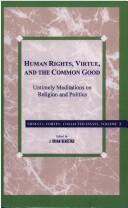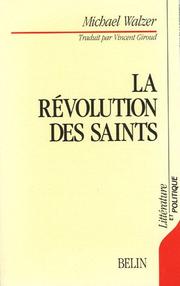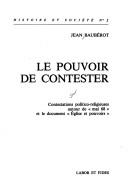| Listing 1 - 10 of 32 | << page >> |
Sort by
|
Book
ISBN: 9788828400073 8828400072 Year: 2018 Publisher: Brescia: Scholé,
Abstract | Keywords | Export | Availability | Bookmark
 Loading...
Loading...Choose an application
- Reference Manager
- EndNote
- RefWorks (Direct export to RefWorks)
L'esistenza nel mondo classico di un potere pubblico a partecipazione cristiana, precedente la "cristianizzazione" della legislazione e delle istituzioni imperiali, è un'ipotesi plausibile, esistono precisi indizi documentali. Tuttavia, l'interesse degli storici non si è quasi mai rivolto alle specificità teologiche, socio-economiche e psicologiche di questa presenza politica. Questo saggio si propone di ricostruire la genealogia del politico cristiano nell'impero "pagano", un personaggio culturalmente "scomodo" e storiograficamente inedito. Emerge, così, una figura del rimosso culturale cristiano, finalmente liberata come risorsa per raccontare un'altra storia, che interseca teologia politica, storia del cristianesimo antico, storia delle religioni e storia sociale
Christianity and politics --- History. --- Christianity and politics--History

ISBN: 084768279X 9780847682799 Year: 1996 Volume: 3 Publisher: Lanham (Md.): Rowman & Littlefield,
Abstract | Keywords | Export | Availability | Bookmark
 Loading...
Loading...Choose an application
- Reference Manager
- EndNote
- RefWorks (Direct export to RefWorks)
Christianity and politics --- Christianity and politics. --- History. --- Christianity and politics - History.

ISBN: 2701110661 9782701110660 Year: 1987 Publisher: Paris: Belin,
Abstract | Keywords | Export | Availability | Bookmark
 Loading...
Loading...Choose an application
- Reference Manager
- EndNote
- RefWorks (Direct export to RefWorks)
Puritans --- Calvinism --- Christianity and politics --- History --- Great Britain --- Church history --- Christianity and politics - History --- Great Britain - Church history - 15th century
Book
ISBN: 9788883344374 8883344375 Year: 2010 Volume: 15 Publisher: Roma: Viella,
Abstract | Keywords | Export | Availability | Bookmark
 Loading...
Loading...Choose an application
- Reference Manager
- EndNote
- RefWorks (Direct export to RefWorks)
Saints --- Christianity and politics --- Church and state --- Enlightenment. --- Christianisme et politique --- Eglise et Etat --- Siècle des lumières --- Cult --- History --- 18th century --- Culte --- Histoire --- Enlightenment --- Siècle des lumières --- Christianity and politics - History - 18th century --- Church and state - History - 18th century --- Saints - Cult - History - 18th century --- Maria Francisca quinque plagarum --- Alphonsus-Maria de Ligorio --- Lumières
Book
ISSN: 09442294 ISBN: 9782875742254 9782875741226 9782875741219 2875741217 9782875741226 2875741225 2875742256 Year: 2014 Volume: 79-80,86 79-80, 86 Publisher: Bruxelles: Peter Lang,
Abstract | Keywords | Export | Availability | Bookmark
 Loading...
Loading...Choose an application
- Reference Manager
- EndNote
- RefWorks (Direct export to RefWorks)
Christian democracy --- Internationalism --- Christianity and politics --- Christian democratic parties --- History --- Démocratie chrétienne --- Partis démocrates-chrétiens --- Démocratie chrétienne --- Partis démocrates-chrétiens --- C8 --- christen-democratie --- internationalisme --- Ideologie en politiek --- Christianisme et politique --- Internationalisme --- Histoire --- Internationalism. --- Internationale démocrate-chrétienne --- 20th century --- Europe --- International cooperation --- Internationalisme. --- Partis démocrates-chrétiens. --- Christian democracy - History - 20th century --- Christianity and politics - History - 20th century
Book
ISBN: 2227301473 2890394735 9782890394735 9782227301474 Year: 1990 Publisher: Montréal: Paris: Paulines, Le Centurion,
Abstract | Keywords | Export | Availability | Bookmark
 Loading...
Loading...Choose an application
- Reference Manager
- EndNote
- RefWorks (Direct export to RefWorks)
Christianity and politics --- Church and state --- Religion and politics --- Eglise catholique --- Eglise et Etat --- Religion et politique --- Catholic Church --- Aspect politique --- John Paul --- Political and social views --- History --- 241.62*3 --- Theologische ethiek: houding tegenover de staat --- 241.62*3 Theologische ethiek: houding tegenover de staat --- Christianity and politics - History
Book
ISBN: 3459010568 9783459010561 Year: 1976 Volume: 18 Publisher: München: Kaiser,
Abstract | Keywords | Export | Availability | Bookmark
 Loading...
Loading...Choose an application
- Reference Manager
- EndNote
- RefWorks (Direct export to RefWorks)
Christianity and politics --- History --- Bonhoeffer, Dietrich, --- 230.241 "19" --- Lutheraans-evangelisch systematische theologie--20e eeuw. Periode 1900-1999 --- 230.241 "19" Lutheraans-evangelisch systematische theologie--20e eeuw. Periode 1900-1999 --- Bonhoeffer, D. --- Бонхёффер, Д. --- Bonkhëffer, D. --- Бонхёффер, Дитрих, --- Bonkhëffer, Ditrikh, --- Bonhēfers, Dītrihs, --- Бонхёффер, Дитрих --- Bonkhëffer, Ditrikh --- Bonhēfers, Dītrihs --- Christianity and politics - History --- Bonhoeffer, Dietrich, - 1906-1945

ISBN: 2825900117 9782825900116 Year: 1976 Volume: 2 Publisher: Bruxelles: Labor,
Abstract | Keywords | Export | Availability | Bookmark
 Loading...
Loading...Choose an application
- Reference Manager
- EndNote
- RefWorks (Direct export to RefWorks)
Protestant churches --- Church and state --- Christianity and politics --- History --- France --- Church history --- Fédération protestante de France. --- Protestant sects --- Christian sects --- Protestantism --- Protestant churches - France - History - 20th century --- Church and state - France - History - 20th century --- Christianity and politics - History - 20th century --- France - Church history - 20th century
Book
ISBN: 1316323536 1316330214 131632687X 1316333558 1316320170 1316104915 1107088488 1107459311 9781107088481 1316289494 9781316320174 9781316104910 1316310159 Year: 2015 Publisher: New York: Cambridge university press,
Abstract | Keywords | Export | Availability | Bookmark
 Loading...
Loading...Choose an application
- Reference Manager
- EndNote
- RefWorks (Direct export to RefWorks)
This volume examines 1 Corinthians 1-4 within first-century politics, demonstrating the significance of Corinth's constitution to the interpretation of Paul's letter. Bradley J. Bitner shows that Paul carefully considered the Roman colonial context of Corinth, which underlay numerous ecclesial conflicts. Roman politics, however, cannot account for the entire shape of Paul's response. Bridging the Hellenism-Judaism divide that has characterised much of Pauline scholarship, Bitner argues that Paul also appropriated Jewish-biblical notions of covenant. Epigraphical and papyrological evidence indicates that his chosen content and manner are best understood with reference to an ecclesial politeia informed by a distinctively Christ-centred political theology. This emerges as a 'politics of thanksgiving' in 1 Corinthians 1:4-9 and as a 'politics of construction' in 3:5-4:5, where Paul redirects gratitude and glory to God in Christ. This innovative account of Paul's political theology offers fresh insight into his pastoral strategy among nascent Gentile-Jewish assemblies.
Christianity and politics --- Political theology --- Theology, Doctrinal --- Public theology --- Christianity --- Church and politics --- Politics and Christianity --- Politics and the church --- Political science --- History of doctrines --- Biblical teaching. --- Political aspects --- Bible. --- Criticism, interpretation, etc. --- 1 Corinthians (Book of the New Testament) --- First Corinthians (Book of the New Testament) --- Christianity and politics - History of doctrines - Early church, ca. 30-600. --- Political theology - Biblical teaching.
Book
ISBN: 9780802872579 0802872573 Year: 2015 Publisher: Grand Rapids (Mich.): Eerdmans,
Abstract | Keywords | Export | Availability | Bookmark
 Loading...
Loading...Choose an application
- Reference Manager
- EndNote
- RefWorks (Direct export to RefWorks)
In this book Bruce Winter explores the varied responses of the first Christians to requirements to render divine honors to the Caesars as the conventional public expression of loyalty to Rome and its rulers. How did they cope with the culture of emperor worship when they were required to give their undivided loyalty to Jesus? First examining the significant primary evidence of emperor worship and the enormous societal pressure the first Christians would have faced to participate in it, Winter then looks at specific New Testament evidence in light of his findings. He examines individual cities and provinces and the different ways in which Christians responded to the pressure to fulfill their obligations as citizens and participate in the conventional expressions of loyalty to the Roman Empire.
Church and state --- Christianity and politics --- Christians --- Church history --- Eglise et Etat --- Christianisme et politique --- Chrétiens --- Eglise --- History --- Political activity --- Histoire --- Activité politique --- 27 "00/01" --- Apostolic Church --- Christianity --- Church, Apostolic --- Early Christianity --- Early church --- Primitive and early church --- Primitive Christianity --- Fathers of the church --- Great Apostasy (Mormon doctrine) --- Religious adherents --- Church and politics --- Politics and Christianity --- Politics and the church --- Political science --- Christianity and state --- Separation of church and state --- State and church --- State, The --- Kerkgeschiedenis--?"00/01" --- Political aspects --- Herrscherkult. --- Frühchristentum. --- Church and State - Rome. --- Christians - Political activity - Rome. --- Church history - Primitive and early church, ca. 30-600. --- Christianity and politics - History - Early church, ca. 30-600. --- Römisches Reich. --- Chrétiens --- Activité politique --- Political activity. --- Church and state - Rome --- Christianity and politics - History - Early church, ca. 30-600 --- Christians - Political activity - Rome --- Church history - Primitive and early church, ca. 30-600
| Listing 1 - 10 of 32 | << page >> |
Sort by
|

 Search
Search Feedback
Feedback About UniCat
About UniCat  Help
Help News
News